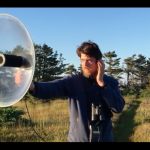Wallace Scot McFarlane ’09 has published his Bowdoin honors thesis about the pollution and cleanup of Androscoggin River in a journal considered to the best in the field of environmental history and among the top journals in history.
The current edition of Environmental History features McFarlane’s article, “Defining a Nuisance: Pollution, Science, and Environmental Politics on Maine’s Androscoggin River,” along with two other articles.
The river, which wends its way through western Maine until it joins the Kennebec River at Merrymeeting Bay, was notorious in the first half of the 20th century for its noxious rotten-egg odor and 20-foot drifts of yellow-brown foam. Pollution from pulp and paper mills had turned the Androscoggin into one of the most polluted rivers of its size in the United States.
Taking advantage of historical documents made public only in 2007, McFarlane’s article looks closely at the evolution of the public response to the Androscoggin River’s pollution from the 1940s to the 1970s. He shows that environmental action to remedy the river’s foulness started earlier and was more complicated than commonly thought.
Matthew Klingle, an associate professor in Bowdoin’s history department and environmental studies program, and McFarlane’s thesis advisor, says the article fills out the river’s narrative in a few ways. “One thing it does is complicate the perceived wisdom that no one did anything about the Androscoggin River before the advent of the environmental movement in the 1960s,” he says. “What Scot’s article adds is there were legislative and judicial responses, and that the responses were far more informed by science that previously thought.”
Klingle adds, however, that this science was flawed in some ways. The article, he says, “reminds us that science, for all its virtues and power, is an incomplete and not always effective tool for organizing political action around environmental issues. Science itself is always created in a political environment; it always has historical context. Scot talks about the science in the very real world of water pollution.”
McFarlane’s research was abetted by his access to a trove of papers from the Androscoggin River’s longtime river master, Walter Lawrance. The collection is archived at the Edmund S. Muskie Archives and Special Collections Library at Bates College. In 1947, Lawrance, a chemistry professor at Bates, was appointed by the Maine Supreme Court to control pollution and offensive odors on the river, and he served in this position until 1978. McFarlane writes that Lawrance’s three decades of detailed annual reports “make it possible to trace changes not only in the river but also in the public’s and Lawrance’s own evolving ideas about pollution.”
McFarlane says he believes the paper’s strength “lies in my description of the Androscoggin River, something which left no archive or paper trail of its own, and that the reader understands what a stinking, bubbling mess the river had become, such that people threw up crossing the bridge and could not think straight. I argue that despite explanations otherwise that the conditions on the Androscoggin helped to shape both the environmental movement and Lawrance’s “scientific” decisions. I hope that understanding the Androscoggin’s role in shaping politics (including the Clean Water Act), science and communities will enrich the field of environmental history.”
To read more about McFarlane’s project in his own words, read a Q&A with him.
Mixing Science with History, with a Creative Flourish
 Although McFarlane majored in history and wrote his thesis from a historical bent, his paper was influenced by his science background, according to Klingle. Along with taking many biology classes at Bowdoin, McFarlane assisted John Lichter for two summers in his research on Merrymeeting Bay. Lichter, Bowdoin’s Samuel S. Butcher associate professor in the natural sciences, is studying habitat and food web recovery in the estuary, and part of his research delves into the historical ecology of the Androscoggin River.
Although McFarlane majored in history and wrote his thesis from a historical bent, his paper was influenced by his science background, according to Klingle. Along with taking many biology classes at Bowdoin, McFarlane assisted John Lichter for two summers in his research on Merrymeeting Bay. Lichter, Bowdoin’s Samuel S. Butcher associate professor in the natural sciences, is studying habitat and food web recovery in the estuary, and part of his research delves into the historical ecology of the Androscoggin River.
Lichter says McFarlane was an unusually mature student, who took a year off between high school and college to make a documentary about a controversial dam being proposed for the Neches River in Texas. “He was very thoughtful as a young person,” Lichter comments. Klingle describes McFarlane as “incredibly diligent, creative and a good writer.”
McFarlane’s original honors thesis was a co-winner of the history department’s Class of 1875 Prize in American History in 2009, the same year McFarlane also won the Hawthorne creative writing award for the best short story by a Bowdoin sophomore, junior or senior. Today McFarlane teaches fiction writing at Kings Valley Charter School in Oregon. He received a master’s of arts degree in teaching from Tufts University last year while teaching humanities at Codman Academy Charter School in Boston.
McFarlane, who grew up in Texas, is also a hunter and fisherman, which made him somewhat unique among Bowdoin students, both Lichter and Klingle point out. Klingle says McFarlane’s background and outdoor interests gave him a different perspective on conservation and environmentalism, which was a welcome addition to class discussions on these topics.
According to McFarlane, his initial interest in his thesis project and subsequent research derives in part from his love of rivers. “I’ve always been a river rat,” he explains. Besides doing ecology research on Merrymeeting Bay in the summer, “every winter I duck hunted and smelt fished there, in this beautiful, degraded and recovering ecosystem, of which the Androscoggin happens to be a major tributary.”

